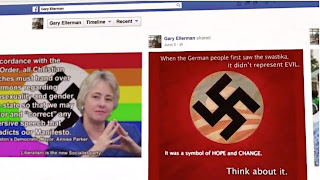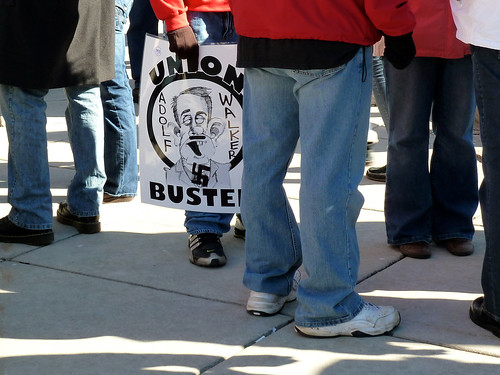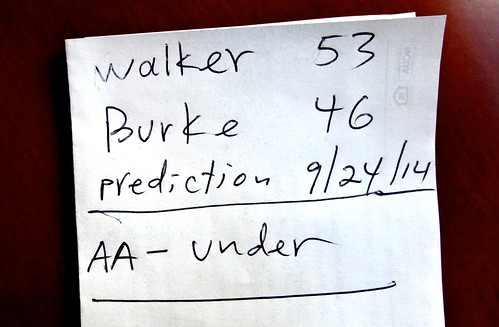"Mary Burke hits Scott Walker in ad with swastika imagery," says the headline at the Washington Post.
Democrat Mary Burke released a new ad Friday accusing Wisconsin Gov. Scott Walker (R) of using a Republican county chairman's "lies to attack" her. The ad includes images of swastikas, it says, the county chair posted to his Facebook page.
Burke's ad seeks to tie Walker to Gary Ellerman, the Jefferson County Republican Party chairman and a former human resources director at Trek Bicycle, the Burke family company where the Democrat used to work.
Ellerman was quoted in a report on the conservative Web site Wisconsin Reporter that cited sources saying Burke was fired from the company. In the report, Ellerman said, “She was not performing. She was (in) so far over her head. She didn’t understand the bike business." Burke denies being fired.
You can watch the whole ad at the link, but here's a screen shot of the part where swastikas float across the screen and have whatever subliminal effect they're supposed to have:

There's writing on the screen, but are we supposed to read it or just have feelings that something awful is going on? If you're watching it on line, you can freeze it and read it, and if you do, you'll find swastikas used against Obama in exactly the same way swastikas were used against Scott Walker back in the 2011 protests, to say that a politician you oppose is like the Nazis.
Burke seems to be saying that Ellerman is bad because he used the swastika, and since Ellerman asserted something about Burke that could help Walker, Walker is connected to Ellerman, and Ellerman's form of expression should be attributed to Walker, making Walker bad.
If we had the time to read the words on the screen, it would be clear that Ellerman's use of the swastika is not pro- but
anti-Nazi, but the ad doesn't give us that time, and in fact, the words on the graphic on the left never fully appear appear on screen. The most you ever see — and I had to freeze the frame to read this — is "cordance with the/Order, all Christian/-ches must hand over/-rmons regarding/-sexuality and gender/state so that we may/or and "correct" any/-rsive speech that/-dicts our Manifesto," a quote attributed to "-ton's Democrat Mayor, Annise Parker." The words "-sexuality and gender" line up with the eyes of the unfamiliar woman who is smirking and has her hands in what could be called the
I-have-an-evil-plan position.

What subliminal effect does that have? One might, in so little time, subliminally read the "evil" woman as Mary Burke. And it is Mary Burke who is wafting swastikas in front of our eyes. I've seen anti-Walker protesters holding signs that put a swastika on Walker, so a casual viewer might think that's what Burke is doing here, even though
she wants to say that's the kind of thing that Ellerman does. But most of us don't know or care about Ellerman any more than we know or care about Parker, so I think the subliminal effect — probably intended — was to
make us think of Walker as a Nazi. That's something that Burke herself cannot say as a mainstream candidate, but it is something Walker-haters have been expressing for years.
At the 2011 protests, we saw many, many signs comparing Walker to Hitler. Meade and I frequently approached people who were holding these signs. Asked to explain, they always defended the comparison. Here's of photo of mine from February 2011:
 I asked that woman behind the sign if she thought Scott Walker was like Hitler
I asked that woman behind the sign if she thought Scott Walker was like Hitler, and she said "Yes." So I followed up with: "Are you saying that you think fascism could come to America?" And she said, "It's what's happening."
And then there was
this woman, also from February 2011:
The expression on her face and the tone of her voice when she said "
like Hitler" is something Meade and I have never forgotten. (Watch how quickly she otherizes Meade.)
Here's an "Adolf Walker" sign with a swastika.
 Here
Here's a young woman with a sign that says "Walker is a dictator" and has an image of Walker with a Hitler mustache. She says she "definitely" thinks Walker is like Hitler. Why? "He doesn't do nice things. He's not a nice person."
Meade follows up: "So, anyone who's not nice is like Hitler?" She tries again: "Well, no. He doesn't do what he should, doesn't do the right thing, and he's doing something that might ruin a lot of things for people. He's pretty much ruining, like, our future."
Meade offers: "You don't think that's over the top, that you're comparing him to Adolf Hitler?" She responds: "It might be a little over the top." Meade: "Just a little?" She makes the concession
that might be perhaps what Gary Ellerman would say about Obama: "Just a little, but we kind of need to be dramatic in something like this."
An older woman cuts in and says: "It brings the point across." Meade: "And the point is?" Woman: "The point is this is a democracy, not a dictatorship." Meade asks whether there was something undemocratic about the election back in November, and she says: "Nothing. But what he's doing now is undemocratic." The woman continues, admitting that she didn't vote for Walker, but it's undemocratic because he's not "willing to compromise and negotiate... and that's what democracy is." That's what a lot of people thought about about Obama — quite aptly — when he said "I won" and foisted Obamacare on us when clearly there wasn't majoritarian support for it.
Now, you can see that the young and the older woman are nice people, not extremists, but aggrieved by the policies of the candidate who won the last election, and that they are appropriating a vivid graphic symbol for dramatic effect. Personally, I would not display a swastika as a way to make an exaggerated point about an American politician, but others do — on the right and on the left.
Obviously, I don't refrain from showing you that others are using a swastika in their form of expression, and you might say, that's exactly what Mary Burke is doing in her new ad.
But I am showing you things
carefully, so you can study them, and to slow things down so there is no subliminal effect, no irrational roiling of the emotions. And that's exactly what Mary Burke is not doing. Her ad begins with a picture of Walker standing with "a Walker campaign worker and donor who puts pictures like
this on his Facebook page." The image — my screen shot, above — slips by in 3 seconds, obliterating any hope of figuring out that Ellerman is not a Nazi fan and that he's just another Wisconsinite using dramatic imagery to get his point across.
Ironically, Burke's use of the swastika works exactly like Ellerman's, and
she's doing the very thing defenders of the ad will say she's trying to criticize Ellerman for doing. Arguably, it's worse, because it's not a still image that you can gaze at until you understand. It means to creep in by the backdoor to your mind.
AND:
From February 20, 2011: "Do you think Scott Walker deserves to be compared to the Nazis?"/"Yes, I do":
ALSO: I'd written "Annie Parker," but it's Annise Parker.
Here's the story the swastika graphic was about:
The city of Houston has issued subpoenas demanding a group of pastors turn over any sermons dealing with homosexuality, gender identity or Annise Parker, the city’s first openly lesbian mayor. And those ministers who fail to comply could be held in contempt of court.























